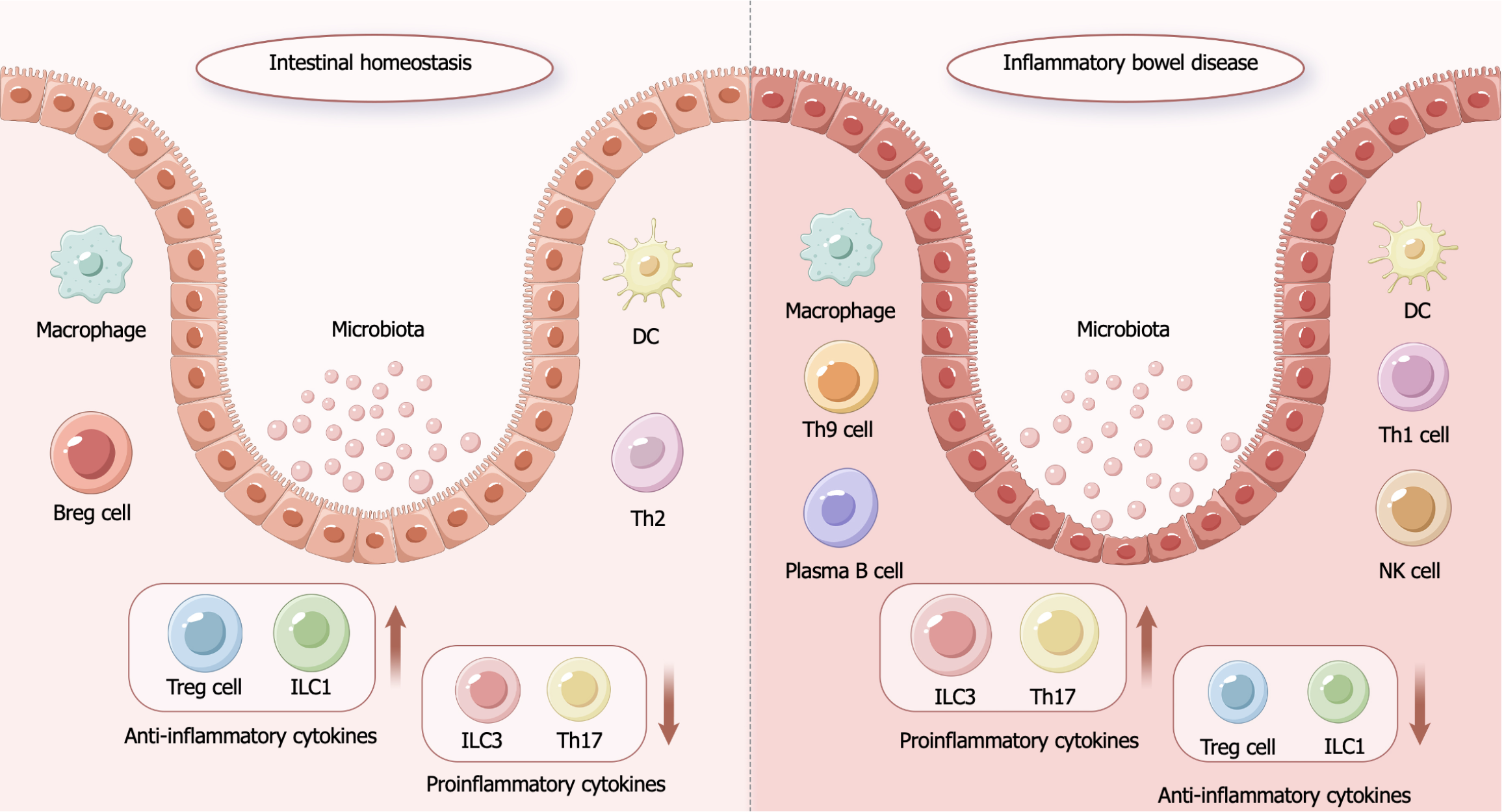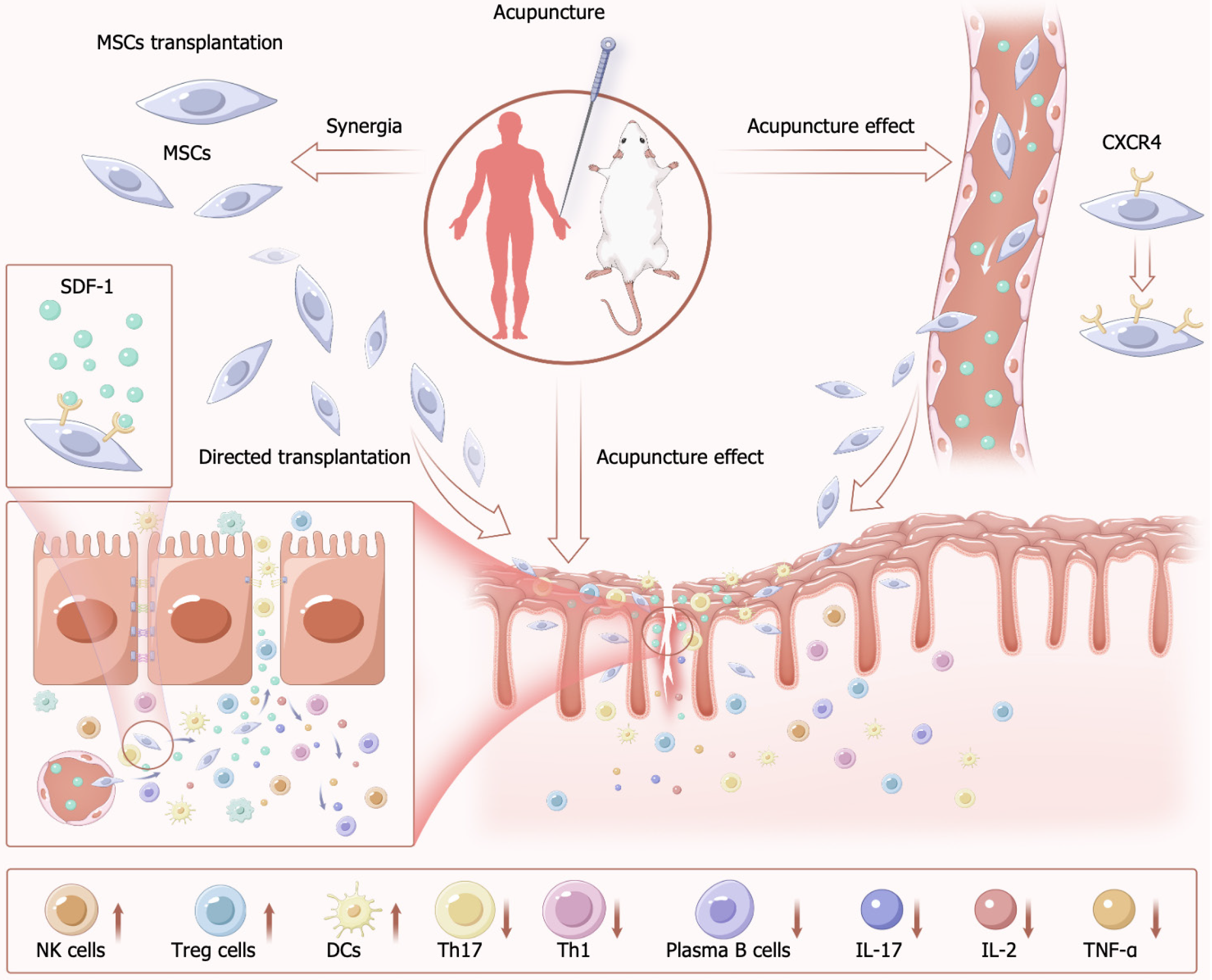Copyright
©The Author(s) 2025.
World J Stem Cells. Jul 26, 2025; 17(7): 105371
Published online Jul 26, 2025. doi: 10.4252/wjsc.v17.i7.105371
Published online Jul 26, 2025. doi: 10.4252/wjsc.v17.i7.105371
Figure 1 The pathogenesis of inflammatory bowel disease.
In intestinal homeostasis state, the colonic epithelium is structurally intact, microorganisms are isolated from the intestine by the intestinal barrier, the body’s immune system is in a state of balance and the intestinal microenvironment is in a state of homeostasis. In the state of inflammatory bowel disease, the colonic epithelial structure is disrupted, the intestinal barrier is not functioning, microorganisms in the intestinal tract are exposed underneath the mucous membrane, and the expression of proinflammatory-related factors increases, thereby disrupting the immune balance and the homeostasis of the intestinal microenvironment. DC: Dendritic cell; Breg: Regulatory B cell; Th2: T helper type 2 cell; Treg: Regulatory T cell; ILC1: Type-1 innate lymphoid cell; ILC3: Type-3 innate lymphoid cell; Th17: T helper type 17 cell; Th9: T helper type 9 cell; Th1: T helper type 1 cell; NK: Natural killer.
Figure 2 Schematic diagram of the synergistic mechanism between acupuncture and mesenchymal stem cells.
Acupuncture can enhance the efficiency of exogenous mesenchymal stem cell (MSC) transplantation, thereby promoting their more effective arrival at the damaged colonic site. Concurrently, acupuncture can also promote the release of endogenous MSCs and increase the expression of the C-X-C chemokine receptor type 4 receptor on MSCs. As the expression of stroma cell-derived factor 1 in the peripheral blood circulation increases, the stroma cell-derived factor 1/C-X-C chemokine receptor type 4 pathway is activated, enhancing the homing ability of MSCs. Upon arrival near the damaged colonic tissue, MSCs improve intestinal injury through anti-inflammatory, antioxidant, and repair mechanisms. In the process of acupuncture synergizing with MSCs, acupuncture can also directly influence changes in the local microenvironment of the injury. Therefore, the combination of acupuncture and MSC transplantation improves the symptoms of inflammatory bowel disease. MSCs: Mesenchymal stem cells; SDF-1: Stroma cell-derived factor 1; CXCR4: C-X-C chemokine receptor type 4.
Figure 3 Mechanisms of acupuncture combined with mesenchymal stem cells in the treatment of inflammatory bowel disease.
MSCs: Mesenchymal stem cells; SDF-1: Stroma cell-derived factor 1; CXCR4: C-X-C chemokine receptor type 4; NK: Natural killer; Treg: Regulatory T cell; DCs: Dendritic cells; Th17: T helper type 17 cell; IL: Interleukin; TNF: Tumor necrosis factor.
- Citation: Ma WG, Si YX, Zhang YL, Gao WF, Dong YG, Li YQ, Xu ZF, Xi Q, Li ZZ. Combining acupuncture and mesenchymal stem cell therapy offers promise as a treatment for inflammatory bowel disease. World J Stem Cells 2025; 17(7): 105371
- URL: https://www.wjgnet.com/1948-0210/full/v17/i7/105371.htm
- DOI: https://dx.doi.org/10.4252/wjsc.v17.i7.105371











